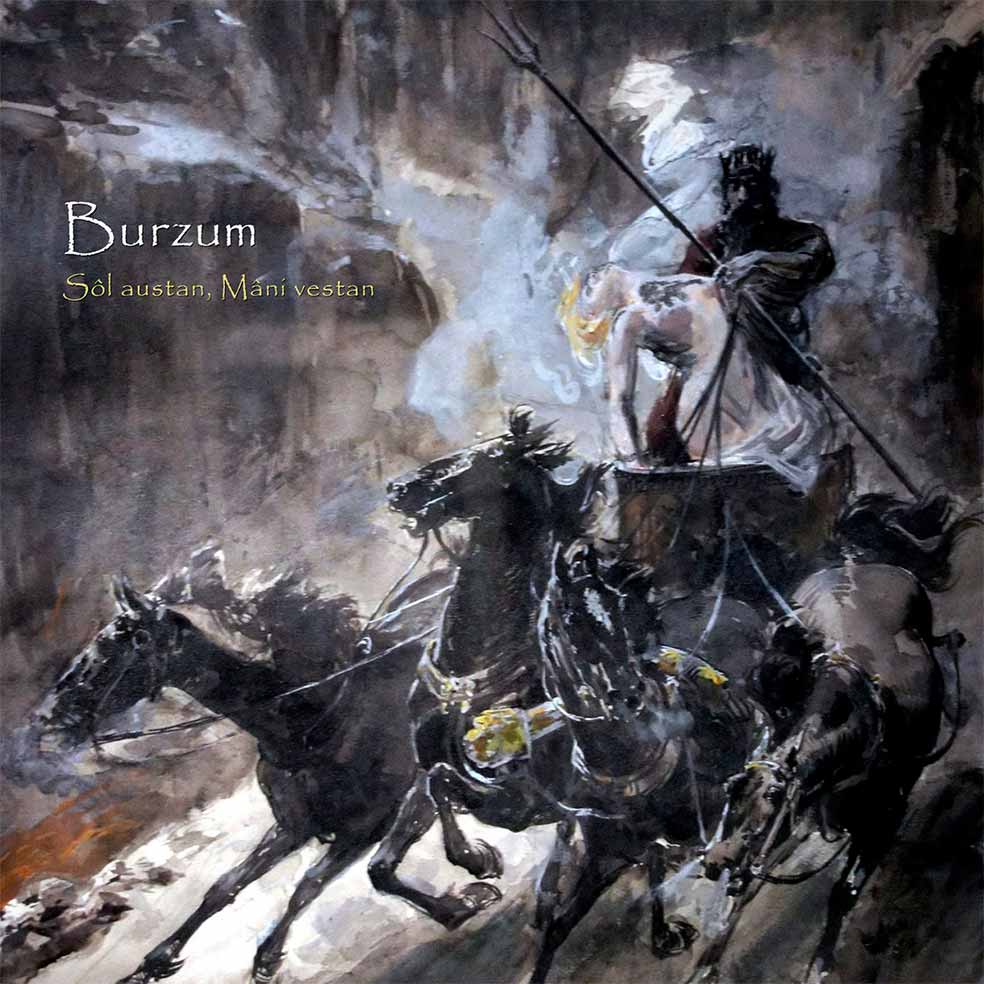Burzum Going Ambient... Again - 72%
Written based on this version: 2013, CD, Byelobog Productions (Digipak)
Sometimes I have to wonder if Burzum is known for the shenanigans of the mastermind behind it or for the music. No offense to Varg, but he sure made a lot of waves in his youth with his escapades and while I do not contest the value of his early works, I still do wonder if he got known and appreciated through them. Mayhem had a similar fate, getting known through the imagery and the extreme stupidity of some of the band members instead of their musical endeavours, a bad thing since Mayhem is probably the most original out of all old school black metal bands managing to do not sound the same album after album.
After 15 years of prison, Varg Vikernes releases Belus, a much anticipated album by a fan-base eager to listen to a proper follow-up to Filosofem after two mediocre to disappointing ambient albums (I'll give him credit for the lack of logistics in prison). Both Belus and Fallen were good, musicaly wise (except for Varg's vocals), retaining much of the elements from the early Burzum albums (though with a better production quality) but Umskiptar already started to raise some question marks regarding Varg's ability to create musical quality rather than quantity (3 albums in 3 years). While not bad, Umskiptar had some flaws that made the overall experience tiresome like the length being one of the main problems, Varg's vocal performance and some inconsistencies in terms of song-writing.
Sôl austan, Mâni vestan is Varg's practical statement that his business with the black metal scene is over. He made the statement before releasing this work, and he partially confirmed it after releasing it. But people made one huge mistake when they labeled this work as a natural continuation of the last ambient album Burzum released. No folks, the music is indeed ambient, but what this one lacks when compared with the previous two dark ambient albums is the medieval atmosphere (well not completely, but is much less used here than in the previous two).
The new Burzum offering is entirely instrumental, partly because it also represents the soundtrack of a movie done by Varg's wife, Marie Cachet. It contains almost an hour of audible experience, separated in 11 songs, all of them though should be taken as a whole and not separately. There is no song that detaches itself from the rest of the tracks, all of them flow naturaly in an equal manner and at best, you can find moments of sheer delight, relaxing tunes and fortunately, it does not lack variety. The ambient passages are for the most part inspired ones, but they may seem drag on, especially for those that do not have the patience to fully experience an ambient work. One of the mistakes the metal community makes is that it considered that Varg has pretty much left the metal influences behind. He indeed left the metal scene but he still retains that grim, dark atmosphere that made Burzum inspire a whole palette of black metal bands that rely on atmosphere, rather than sheer brutality and rawness. Put some metal riffs and some drumming here, and you would have the same old Burzum.
One thing Varg never attained nor in the past, nor with this offering, is to be memorable. Varg just cannot find his own style and identity with this sound, with this music, with this genre as a whole. He found it on Filosofem while he did not bid farewell to black metal (even though by the black metal standards from back then, that was surely a departure). While Sôl austan, Mâni vestan has some moments of genius, especially in the opening part of the album, all just fades away fast making you think that Varg just messed up with the keyboard thinking that a cool sound might just drop from the sky. I am just glad that he still uses a variety of instruments other than keyboards. Sôl austan, Mâni vestan features acoustic pasages and some scarce bass line, but the predominantly used instrument remains the keyboard. Lack of inspiration is also clear in the last couple of songs where variety is replaced by repetitiveness.
To conclude, asking me to point out a song from this record is a tough job. "Rûnar munt þû finna" is a representative song for this incarnation of Burzum, but I would advice all of you that are willing to give this album a chance to listen to it as a whole and then pass judgement. If you don't like it, just stop listening. If you do love Burzum for the black metal works, other than the atmospheric aspects of the music, you won't find anything metal here. I do have to admit that dark ambient music has always suffered from relentless criticism from metal fans, especially if a band is known for other works rather than its ambiental outputs. Burzum is one of them. This album, while it is not a hidden gem, and is far from being relevant to the genre, has some good moments. It is a love it or hate it album, a hit or miss, a gamble to be more precise. Probably out of 10 listeners, if 1 can see it for what it is, that is commendable. But in the end, both Burzum and this album were not made to appeal to the masses. And certainly, Varg, first and foremost, writes music that he himself likes, not music that the public wants. Only time will tell if Varg was a genius when he decided to walk this path, or if it was just another failure.

